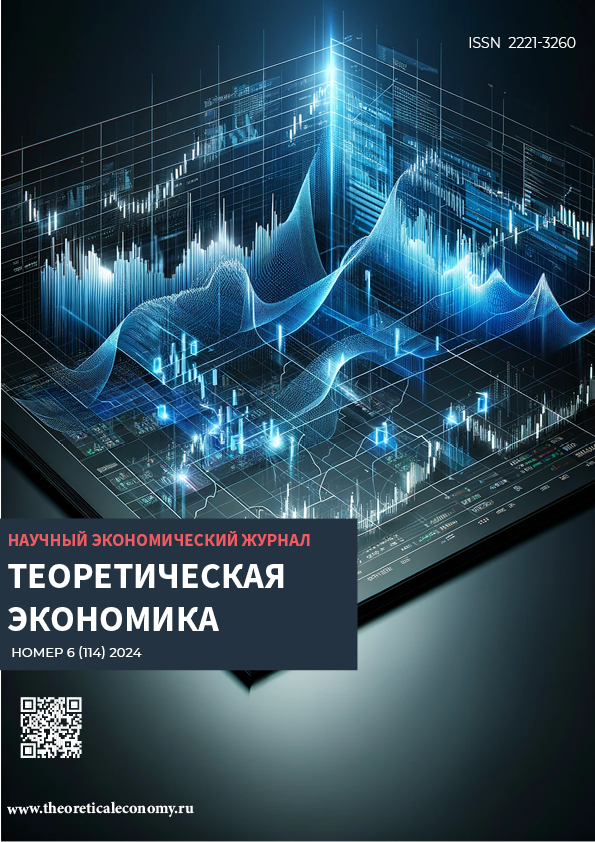Kursk, Kursk, Russian Federation
The economic policy of the Russian leadership is subject to various criticisms in domestic publications. At the same time, as a rule, there are no quantitative estimates of growth reserves unrealized during its implementation and an analysis of possible ways to use them, which is necessary for making informed decisions for the future. The purpose of the study: to determine ways to accelerate the development of the Russian economy based on studying the economic growth potential that was unrealized in the previous period. Tasks: - build a simulation model describing the process of social reproduction in Russia in the period 2005-2019; - on its basis, draw up growth trajectories that were objectively possible at that time, which would allow accelerating economic development; - identify urgent changes in government regulation of the economy necessary for a more complete realization of development potential. Methods of mathematical statistics and simulation modeling were used. Information base: official statistics data characterizing the state of the Russian economy. The study period is determined by the availability of comparable statistical indicators. Results. A four-sector model of the inter-industry balance has been constructed, describing the reproduction process in 2005-2019. On its basis, possible trajectories of balanced development during that period were compiled. It has been established that with a different economic policy, Russia could have become a net exporter of instruments of labor as early as 2013, and the growth rate would have increased significantly without increasing raw material exports and increasing the size of the labor force. Conclusions: the existing system of state regulation, conditioned by relations of appropriation, prevents the country from entering a trajectory of high growth rates; the organization of state planning is necessary as a means of resolving the contradictions generated by capitalist property; state regulation of the economy should be based on the construction and systematic implementation of long-term trajectories of balanced development. The scope of application of the results is the study of issues of social reproduction and economic policy of the state. Directions for future research: detailing the model used and its application for forecasting and constructing trajectories of economic development.
economic growth potential, inter-sectoral balance model, renewal of fixed assets, growth trajectory, state economic policy, state planning
1. Samuel'son P. E., Nordhaus V. D. Ekonomika. Per. s angl. 19-e izd. – M.: Al'fa-kniga, 2018 – 1328 s.
2. Glaz'ev S. Social'naya spravedlivost' i ekonomicheskiy rost //Telekanal «Car'grad», 08.11.2023. – Internet-resurs – URL: https://tsargrad.tv/articles/socialnaja-spravedlivost-ijekonomicheskij-rost_904655 – Data dostupa: 20.03.2024.
3. Katasonov, V.Yu. Ekonomika Stalina. – M.: Institut russkoy civilizacii, 2014. – 340 s.
4. Galushka A.S., Niyazmetov A.K., Okulov M.O. (2021) Kristall rosta k russkomu ekonomicheskomu chudu. – M.: Nashe zavtra, 2021. – 360 s.
5. Ermakova S. (2024) Minek ne uvidel priznakov peregreva ekonomiki // Vedomosti, 23.04.2024. – Internet-resurs – URL: https://www.vedomosti.ru/economics/articles/2024/04/23/1033674-minek-neuvidel-priznakov – Data dostupa: 25.04.2024.
6. Nabiullina: «Priznaki peregreva rossiyskoy ekonomiki vse esche nablyudayutsya» //Internetgazeta «Real'noe vremya», 22.03.2024. – Internet-resurs – URL:https://m.realnoevremya.ru/news/305495nabiullina-priznaki-peregreva-rossiyskoy-ekonomiki-vse-esche-nablyudayutsya – Data dostupa: 20.04.2024.
7. Bekker Geri S. Chelovecheskoe povedenie: ekonomicheskiy podhod. Izbrannye trudy po ekonomicheskoy teorii: Per. s angl. – M.: GU VShE, 2003. – 672 s.
8. Draker P. Postkapitalisticheskoe obschestvo //Novaya postindustrial'naya volna na Zapade. Antologiya /pod red. V.L. Inozemceva. M.: Academia, 1999. – S.67-100.
9. Lenin V. I. Rech' ob obmane naroda lozungami svobody i ravenstva 19 maya //Poln. sobr. soch., izd. 5.T.38. S.333-372.
10. Marks K. Kapital. T.1 //Marks K., Engel's F. Soch. 2-e izd. – T. 23.
11. Marks K. Ekonomicheskie rukopisi 1857-1859 gg. //Marks K., Engel's F. Soch. 2-e izd. – T. 46. Ch. II.
12. Rossiyskiy statisticheskiy ezhegodnik – 2005-2023. – Internet-resurs – URL: https://rosstat. gov.ru/folder/210/document/12994 – Data dostupa: 23.04.2024.
13. Kotler F. Konec kapitalizma? 14 antidotov ot bolezney rynochnoy ekonomiki. Per. s angl. – M.: Eksmo, 2016. – 288 s.
14. Shvab K. Kapitalizm vseobschego blaga: novaya model' mirovoy ekonomiki. – M.: Eksmo, 2022. – 352 s.
15. Ministerstvo finansov RF. Statistika – Internet-resurs – URL: https://minfin.gov.ru/ru/ statistics/ – Data dostupa: 20.03.2024.
16. Statisticheskiy byulleten' Banka Rossii. – Internet-resurs – URL: http://www.cbr.ru/ statistics/bbs/ – Data dostupa: 20.03.2024.
17. Galochkin V.T. Ekonometrika: uchebnik i praktikum dlya vuzov.– M.: Yurayt, 2024.– 293s.
18. Korolev A.V. Ekonomiko-matematicheskie metody i modelirovanie: uchebnik i praktikum dlya vuzov/ A.V.Korolev.– M.: Yurayt, 2024.– 280s.
19. Ryabushkin B.T. Istoriya sozdaniya i razvitiya otechestvennogo mezhotraslevogo balansa i ego mesta v statistike i makroanalize. – Internet-resurs – URL: https://cyberleninka.ru/article/n/istoriyasozdaniya-i-razvitiya-otechestvennogo-mezhotraslevogo-balansa-i-ego-mesta-v-statistike-i-makroanalize/viewer – Data dostupa: 20.03.2024.
20. Sayapova A.R. Mirovye mezhotraslevye balansy kak instrument ocenki «tochek rosta» nacional'noy ekonomiki – Internet-resurs – URL: https://ecfor.ru/wp-content/uploads/2020/01/ mirovye-mezhotraslevye-balansy-dlya-otsenki-tochek-rosta-ekonomiki.pdf – Data dostupa: 20.03.2024.
21. Istoriya socialisticheskoy ekonomiki SSSR: v 7 t. /IE AN SSSR, – M. Ekonomika, 1977-1980. – T.III. – 535 s.; T.IV. – 519 s.; T.V. – 565 s.
22. Federal'nyy zakon ot 28 iyunya 2014 g. N 172-FZ «O strategicheskom planirovanii v Rossiyskoy Federacii» //Rossiyskaya gazeta, 02.07.2014.
23. Bondarenko H.Yu. Celi i zadachi indikativnogo planirovaniya: zarubezhnyy opyt – Internetresurs – URL: https://cyberleninka.ru/article/n/tseli-i-zadachi-indikativnogo-planirovaniya-zarubezhnyyopyt/pdf – Data dostupa: 20.03.2024.
24. Engel's F. Razvitie socializma ot utopii k nauke /Marks K., Engel's F. Soch. 2-e izd. T.19. S.185-230.
25. Cherkovec, V.N. Planomernost' socialisticheskogo proizvodstva – Moskva: Ekonomika, 1965. – 212 s.
26. Kurs politicheskoy ekonomii /pod red N.A. Cagolova: v 2-h t. (3-e izd., pererab. i dop.) – M.: Ekonomizdat, 1973. – T.2, S.90-116.
27. Spicyn E.Yu. Hruschevskaya slyakot'. Sovetskaya derzhava v 1953-1964 godah. – M.: Konceptual, 2020. – 592 s.
28. Glaz'ev S.Yu. Programma social'no-ekonomicheskogo razvitiya Rossii. Social'naya spravedlivost' i ekonomicheskiy rost, 2024. – Internet-resurs – URL: Sergey Glaz'ev – oficial'nyy sayt (glazev.ru) – Data dostupa: 20.04.2024.
 This work is licensed under Creative Commons Attribution-NonCommercial-NoDerivatives 4.0 International
This work is licensed under Creative Commons Attribution-NonCommercial-NoDerivatives 4.0 International


















